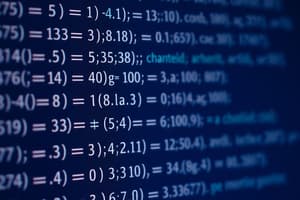Podcast
Questions and Answers
In most programming languages, what are the majority of binary operators?
In most programming languages, what are the majority of binary operators?
What are the design issues for arithmetic expressions?
What are the design issues for arithmetic expressions?
Which type of operators can be either prefix or postfix in C-based languages?
Which type of operators can be either prefix or postfix in C-based languages?
What is the dominant role of imperative languages?
What is the dominant role of imperative languages?
What are the fundamental means of specifying computations in a programming language?
What are the fundamental means of specifying computations in a programming language?
In C89, how is the Boolean type represented?
In C89, how is the Boolean type represented?
What is the result of the expression 'a < b < c' in C?
What is the result of the expression 'a < b < c' in C?
Which language uses '==' as the relational operator instead of '='?
Which language uses '==' as the relational operator instead of '='?
What is the purpose of conditional targets in Perl?
What is the purpose of conditional targets in Perl?
What is the shorthand method of specifying a commonly needed form of assignment in C and C-based languages?
What is the shorthand method of specifying a commonly needed form of assignment in C and C-based languages?
In Ruby, how are arithmetic, relational, and assignment operators implemented?
In Ruby, how are arithmetic, relational, and assignment operators implemented?
What is the purpose of the ternary operator in C-based languages like C and C++?
What is the purpose of the ternary operator in C-based languages like C and C++?
What is the significance of referential transparency in a program?
What is the significance of referential transparency in a program?
What is the potential drawback of operator overloading?
What is the potential drawback of operator overloading?
What is the purpose of explicit type conversions in C-based languages?
What is the purpose of explicit type conversions in C-based languages?
Which languages have additional relational operators === and .==, similar to their cousins == and !=?
Which languages have additional relational operators === and .==, similar to their cousins == and !=?
In C89, what type is used for Boolean representation?
In C89, what type is used for Boolean representation?
Which of the following is a legal expression in C, but the result may not be as expected?
Which of the following is a legal expression in C, but the result may not be as expected?
In which languages does the assignment operator = create a result and can be used as an operand?
In which languages does the assignment operator = create a result and can be used as an operand?
Which languages allow multiple-target multiple-source assignments, as well as the interchange of variables in an assignment statement?
Which languages allow multiple-target multiple-source assignments, as well as the interchange of variables in an assignment statement?
Flashcards are hidden until you start studying
Study Notes
Arithmetic Expressions and Operators
- Unary operators have one operand, binary operators have two, and ternary operators have three operands
- Operator precedence rules define the order in which operators of different precedence levels are evaluated, typical levels include parentheses, unary operators, exponentiation, multiplication/division, and addition/subtraction
- Operator associativity rules define the order in which adjacent operators with the same precedence level are evaluated, with exceptions such as right-to-left associativity for certain operators
- In Ruby, arithmetic, relational, assignment operators, and others are implemented as methods, allowing them to be overridden by application programs
- Conditional expressions in C-based languages like C and C++ can be represented using the ternary operator, for example, average = (count == 0) ? 0 : sum / count
- Operand evaluation order starts with variables fetching values from memory, followed by constants, parenthesized expressions, and function calls
- Functional side effects occur when a function changes a two-way parameter or a non-local variable, which can lead to unexpected behavior in expressions
- Solutions to the problem of functional side effects include disallowing them in the language definition or fixing operand evaluation order
- Referential transparency in a program allows the substitution of expressions with the same value without affecting the program's behavior, making the program's semantics easier to understand
- Operator overloading, where an operator is used for more than one purpose, can aid readability but may also lead to potential problems and loss of readability
- Type conversions include narrowing and widening conversions, as well as mixed-mode expressions and coercions, which can decrease the type error detection ability of the compiler
- Explicit type conversions, also known as casting in C-based languages, allow for the explicit conversion of types, for example, (int)angle in C or float(sum) in F#
Studying That Suits You
Use AI to generate personalized quizzes and flashcards to suit your learning preferences.




